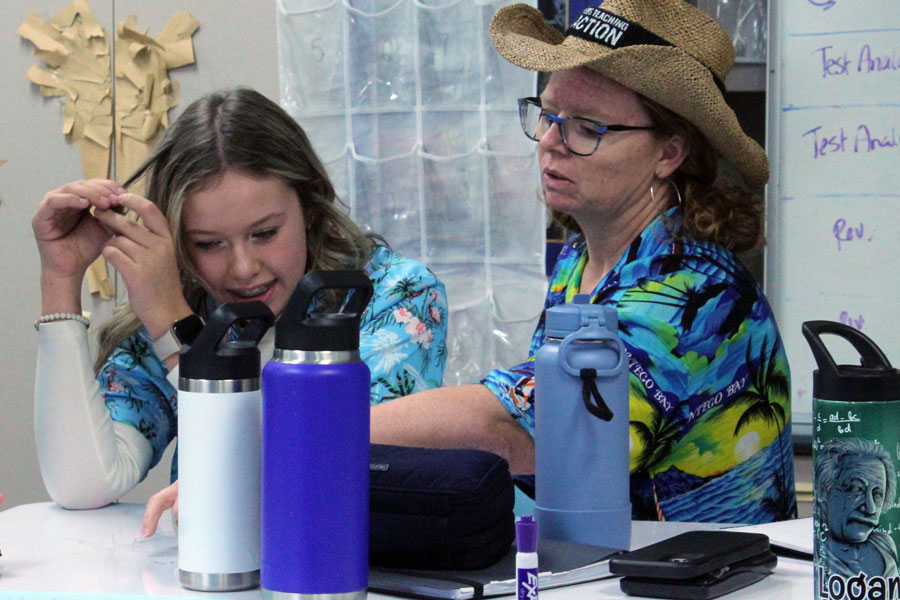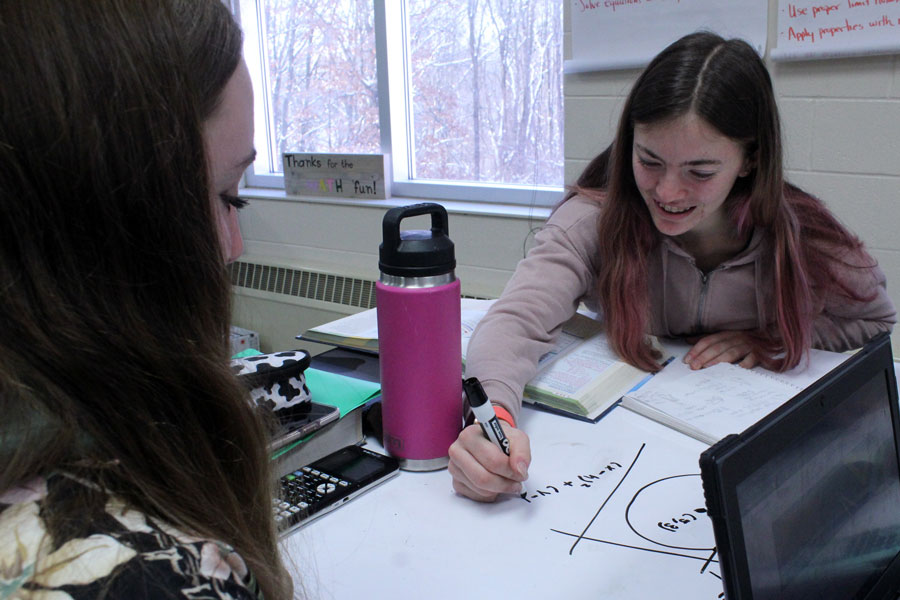Lowell — Principal Steve Gough is proud of the rigorous academics the high school offers students, but he knows it can put a squeeze on their schedules.
Each hour of the day has multiple AP courses being taught. Additionally, students can engage in a variety of extra-curricular activities, including sports, clubs, musical groups and more. Students might also attend dual-enrollment college classes, work after school, or have family obligations.
For students who are struggling with a subject or have fallen behind on homework, this makes it difficult for them to get the help they need without sacrificing instruction in another important class.
To solve the problem, Gough and the rest of the high school staff introduced a flextime schedule this year, opening up a 30-minute class period where students can attend a class or session to meet their specific needs.
“We’re creating time in the day where students get the help they need, the activities they need, and the support they need. And, they’re not missing any instruction,” Gough said.
At the beginning of the school year, the flextime schedule was implemented once a week. However, with the start of the second trimester, the Michigan Department of Education approved the program to run twice a week.
Now, between 8:45 and 9:15 a.m. on Tuesdays and Thursdays, high school students have the chance to make up quizzes or get help with homework. Others utilize the time by attending a seminar on applying through FAFSA for financial aid or scholarship opportunities.
“It’s not that we’re doing things that we haven’t always done,” Gough explained. “We’re just organizing the time so students aren’t missing things they need to do (in order) to do other really important tasks.”
Along with studying, tutoring, and other academic activities, flextime also allows students to focus on extracurriculars or even have a high school recess.
“You have students who need this chance to get some energy out during the school day,” Gough said. “It reflects the real world, though. You can only choose that if all your obligations have been met and your homework is caught up.”

Flextime in Action
In math teacher Danielle Ayala’s flextime class, students work on subjects ranging from algebra to geometry to AP calculus.
“Some of them were assigned, and some of them were by choice,” she said. “There are a few students who said they could use the extra support.”
Ayala bounces around the room checking in with pods of students and providing support as needed, but much of the class engages in peer-to-peer mentoring.
“All the kids who are tutoring are really good about how they’re explaining the information,” she said. “They’re not trying to talk down but really make it make sense.”
‘It’s not that we’re doing things that we haven’t always done. We’re just organizing the time, so students aren’t missing things they need to do (in order) to do other really important tasks.’
— Principal Steve Gough
Lauren Deeds, a 10th-grader, is a frequent volunteer tutor during Ayala’s flextime class. While she enjoys math, she recognizes not everyone does and tries to help others understand concepts they have trouble with.
“It’s nice to get another student’s perspective, and sometimes people understand something better (by) hearing it in a different way,” Lauren said.
Sophomore Paige Kreps-Bunting appreciates Lauren’s willingness to break down geometry concepts Paige struggles with. She said sometimes she needs extra review and Lauren, her friend of 12 years, is the perfect person to help.
Ayala’s flextime class is considered general support for math. Other core subject teachers may offer intervention classes that focus on a specific subject or topic.
There are also enrichment sessions that focus on non-curricular topics like financial aid, as well as extension sessions that expand on current lessons being taught in class.

How it Works
Gough had to reshuffle the high school class schedule to make room for the new program. This included reducing the reading block time on flex days and shortening passing time between classes.
On Mondays, Wednesdays, and Fridays, class periods last 69 minutes but are seven minutes shorter on the two other flex days. Ultimately, students receive 301 minutes of instruction a week, meeting state requirements and adding an extra minute compared to last year.
Along with introducing this instruction schedule and increasing the frequency to twice a week, Lowell also became the first high school in Michigan to use RTI Scheduler to plan, track and communicate the sessions provided.
Using the software, teachers submit the session they’ll be offering and set attendance limits. For intervention classes, they can also assign students to the class if they think their grade warrants mandatory help.
Gough recognized that students may often need help in more than one subject, though.
“We’re talking about ways we can coordinate that well,” he said. “For example, we know that math is the greatest area of struggle among our 1,200 kids, so the math teachers place kids first.”
The school’s secondary concern is literacy, so the English teachers place students next. Then, other classes can assign students. \
On the student side of the program, they receive an email every Thursday with a list of options for the upcoming week’s flextime offerings.
If a teacher has assigned a student to an intervention class to ensure they get extra support, they won’t be able to sign up for one on their own. But if students are unassigned, they get to pick from dozens of general support, enrichment, and extension sessions.
So far, flextime has between 80 and 90% approval, according to student surveys. Gough believes the freedom to choose the classes is the largest factor for the high rating.
“What’s amazing is we actually have students arriving to the flex period more promptly than they arrive for general classes,” he noted. “Kids are going and are very excited about what they’re going to do there, whether it’s for support or something they’re interested in.”
Future Hopes for Program
There is still room to fine-tune and improve the flextime schedule, and faculty are working on it.
For example, since the class currently takes place in the morning, students who are part of the dual-enrollment, career center, or school-to-work programs don’t get the benefits of flextime.
“Right now, we’re focusing on routine and consistency, but eventually, I’d like to find a way to offer this to all students,” Gough said.
By rearranging the school schedule to create time for the flex period, students are losing time for reading intervention. Gough and the teachers are studying ways to regain that time within the current structure.
Another idea is to tie in more opportunities for social connection by periodically having students assigned to one teacher.
“The potential is endless, but we’re just at the beginning of it,” Gough said. “Right now, we’re figuring it out, and it seems to be making a difference.”









